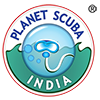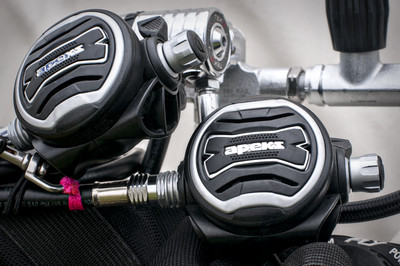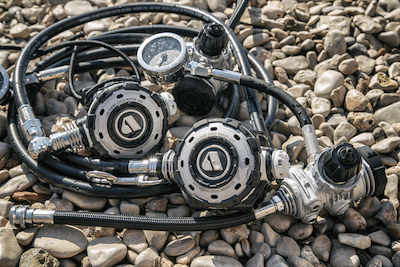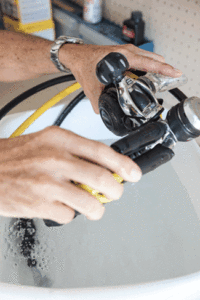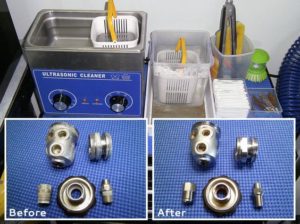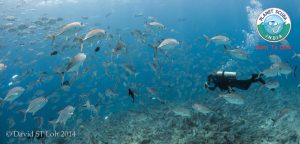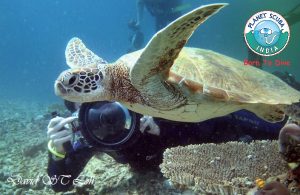When most people think about scuba diving, they picture vibrant coral reefs, sea turtles and fascinating marine life. And though, these are definite reasons to go scuba diving, they are not all that diving has to offer. Did you know that scuba diving has a multitude of positive health benefits? Yes, we are talking of scuba diving for Fit India! Some of the scuba diving health benefits are derived from the physical activity it entails. But there are also proven mental health benefits. In fact, you might be surprised to learn just how far reaching the effects of scuba diving are on both your physical and mental well-being.
Scuba Dive for Fit India & A Healthier You
Here are just a few key benefits you experience when you go scuba diving in India:
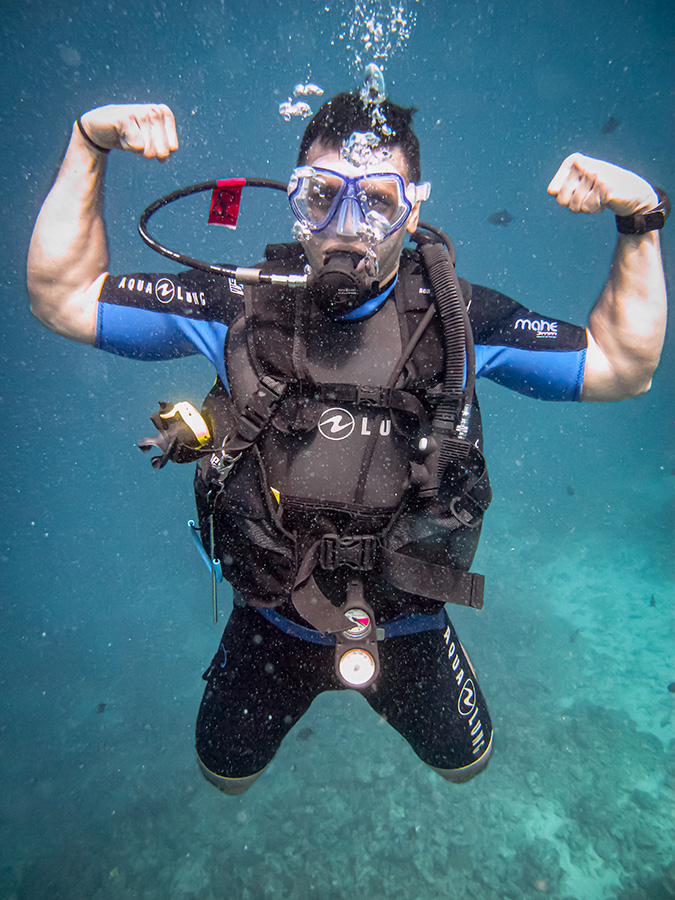 1. It improves your breathing and respiratory system.
1. It improves your breathing and respiratory system.
Scuba diving encourages divers to take long, slow, deep breathes. A calm, slow breathing pattern reduces the risk of a lung-expansion injury while diving. But did you know that it also helps reduce mucus build up?! This breathing pattern has also been known to help with existing conditions, such as asthma. The breathing technique used during diving is similar to that used during some styles of meditation, including yoga. It helps slow down your heart rate, promoting a state of peacefulness. Slow rhythmic breathing can also have a calming effect on your psyche.
2. It increases your fitness levels, strength and flexibility.
Have you heard of resistance training? When you go scuba diving, you’ll be doing that too! Your muscles have to work harder underwater than they would on land due to the increased resistance caused by the water around you. The level of resistance increases significantly when you are swimming against even a mild current. That’s why we recommend scuba diving for Fit India. The more you dive and swim, the more your muscles begin to strengthen. And you’ll also develop endurance as well as flexibility. Scuba diving and swimming doesn’t only give your legs a workout. It can also help build up your core strength, which is important for a good overall posture.
3. It lowers your blood pressure
Remember the first time you went underwater? In all likelihood, you would have experienced a spike in blood pressure. Most divers do, due to the excitement and adrenaline. But this is usually only a temporary increase. Once you have recovered from the initial spike, your heart rate reduces, so does your blood pressure. The slow and deep breathing technique you learn helps lower your blood pressure and keeps you calm throughout the dive.
4. It introduces you to the spectacular marine life underwater
Seeing stunning coral reefs and a fabulous array of fish and critters is enough to put anyone in a good mood. Also, it has been proven that seeing certain colors can affect the brain in many different ways. Scientists believe that being subjected to bright, intense colors, similar to the ones we might find surrounding reefs, can promote feelings of happiness. It can uplift your mood. In addition, the color blue has been known to induce a calming effect on the body.
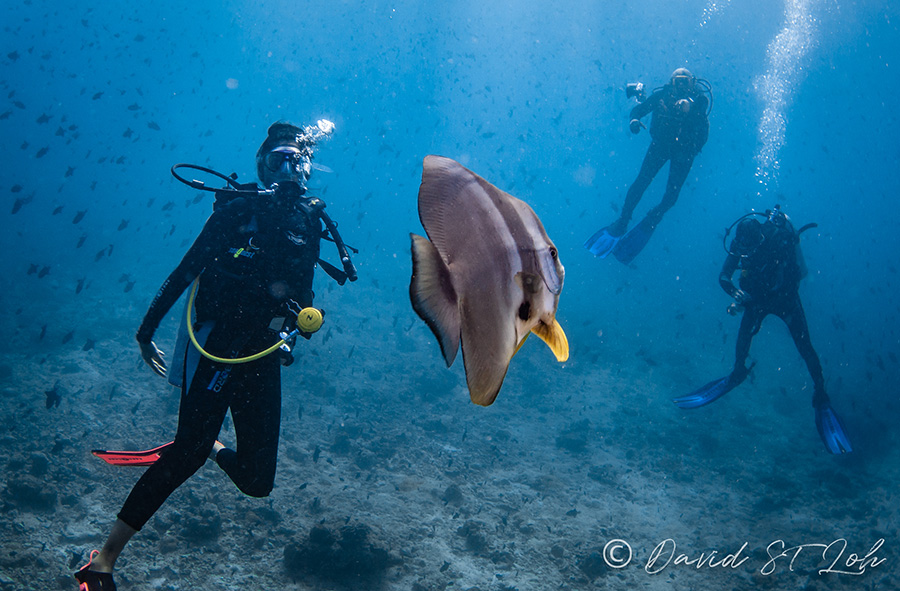 5. It encourages you to travel around the world on an adventure
5. It encourages you to travel around the world on an adventure
Yes, it is possible to dive virtually anywhere on the planet that has a body of water. However, divers tend to travel more than they dive at home. Traveling overseas, exploring and taking time off work, all lead to adventures, excitement and positive experiences. All of which are good for your body, mind and soul. Infinitely much better than being stressed, bored and stuck in a rut, don’t you agree?!
6. It provides you with the healing effects of water
Being underwater has many healing benefits. The likeness to being in the womb is believed to promote feelings of security, well-being and happiness. In addition, being in salt water for long periods of time can cause your body to dehydrate meaning that you tend to drink a lot more after the dive. This in turn means that you are replenishing your cells. You are receiving all the benefits of water both externally and internally.
7. It exposes you to sunlight
Being exposed to sunlight creates vitamin D. Vitamin D helps the absorption of calcium, which in turn keeps bones healthy and strong. Exposure to sunlight also helps increase endorphin production. Now you know why we scuba divers are a happy lot.
8. It has socializing benefits
Diving is a social activity. It involves diving with a buddy. And among divers, we find like-minded people with a common interest. There is a sense of community. A sense of being part of a ‘tribe’ when spending time with other divers. All of which are positive feelings and good for your mental well-being. Did we mention that it also helps lower stress, building confidence and gives you a sense of security and belonging!
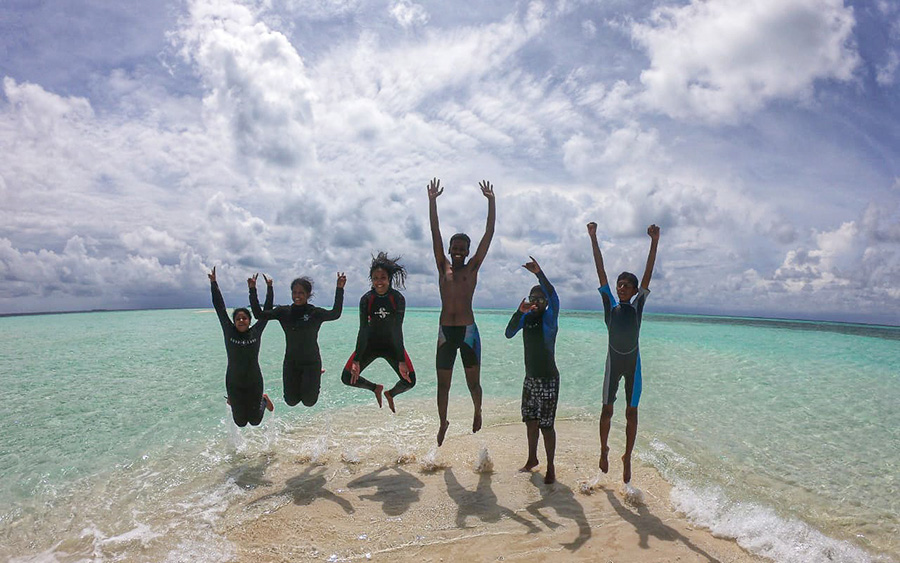 9. It is a great stress reliever
9. It is a great stress reliever
We have mentioned it earlier that the breathing pattern for diving is similar to a meditative breathing pattern. Meditating is a great remedy for stress too. Slower breathing promotes calmness. Not just that, but when we are diving, we are focused on the environment around us which enables us to completely forget work, family, relationships or financial issues. Having this mental ‘time out’ gives the body a chance to rest. It brings the nervous system back to its natural balance. Studies have shown that a relaxed and calm mind promotes a positive mental attitude. It helps you deal with your issues in a calm and rational manner. It reduces feelings of depression.
Corona Virus & Fitness
There are many uncertainties and unknowns surrounding the Corona Virus pandemic. But one thing that is widely believed to be true is that the effects of COVID-19 are generally less severe in a person who is physically healthy and fit. We know, you may not cherish the thought of going to the gym to work on your fitness, but how about going diving instead!
Scuba Diving in India
At Plant Scuba India, we are following recommendations regarding scuba diving health and hygiene standards. We have new procedures in place to ensure that gear is disinfected and all recommendations are being met. If you have tested positive for COVID-19, you will require a doctors medical clearance, as a precautionary measure, prior to participating in any in-water activities. Contact us by email and we can provide you with a form for your doctor to sign.
If you’d like to learn to dive or to join us for fun diving in India, or if you have any questions about scuba diving for Fit India, health and diving, or corona virus and diving, contact us on: holidays@planetscubaindia.com.
We look forward to diving with you soon!
Text: Sarah Ann Wormland, PADI
Photos (in order of appearance): Madhava Reddy, David ST Loh, Gopala Krishnan
Dive India & Advance Your Scuba Skills
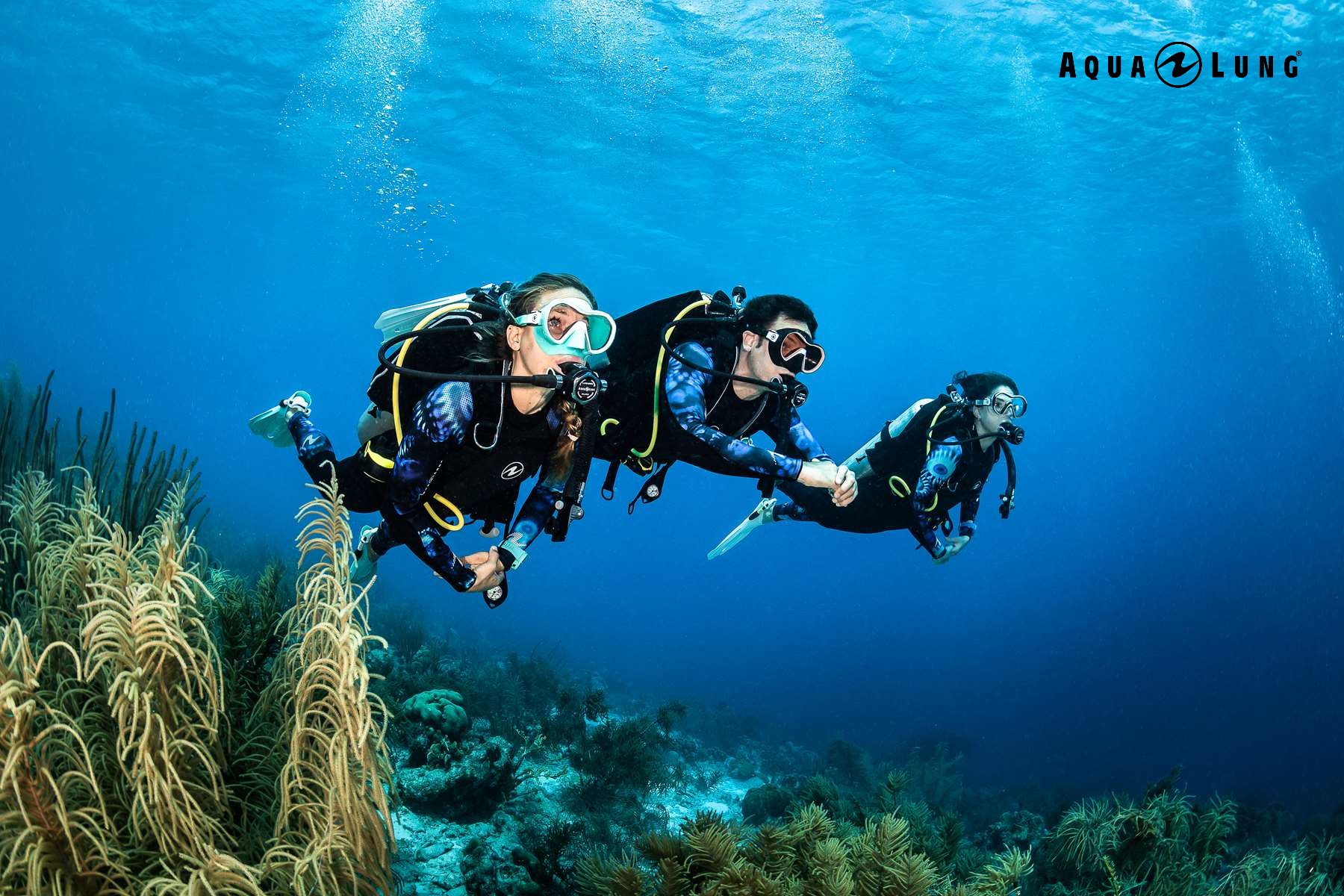
Did you ever dive in India? Are you a certified diver who wants to develop your skills, learn new ones and become a more confident diver? Are you trying to decide between taking a core PADI course or a specialty?
The good news is that as a certified diver you have plenty of options to dive in India. We have a diverse range of sites in our country for you to explore; all while you develop your skills and learn new techniques.
Deciding on which course to take next depends on your current certification level. It also depends on your interests and what you want to get out of the program.
If you are a PADI Open Water Diver, the next course for you is the PADI Advanced Open Water Diver course. This is our recommendation for all Open Water Divers who want to dive India or anywhere else in the world! You’ll make 5 incredible dives with your instructor, including a deep dive and underwater navigation. The other three dives are yours to choose from a wide range of options. In fact, you can start learning most of the courses from home straight away! Get in touch with us to know how.
For those who are already Advanced Open Water certified, the next step is the PADI Rescue Diver Course. Do you want to become a PADI Divemaster or Instructor? Then you’ll need to become a PADI Rescue Diver first. It is a requirement for all pro courses.
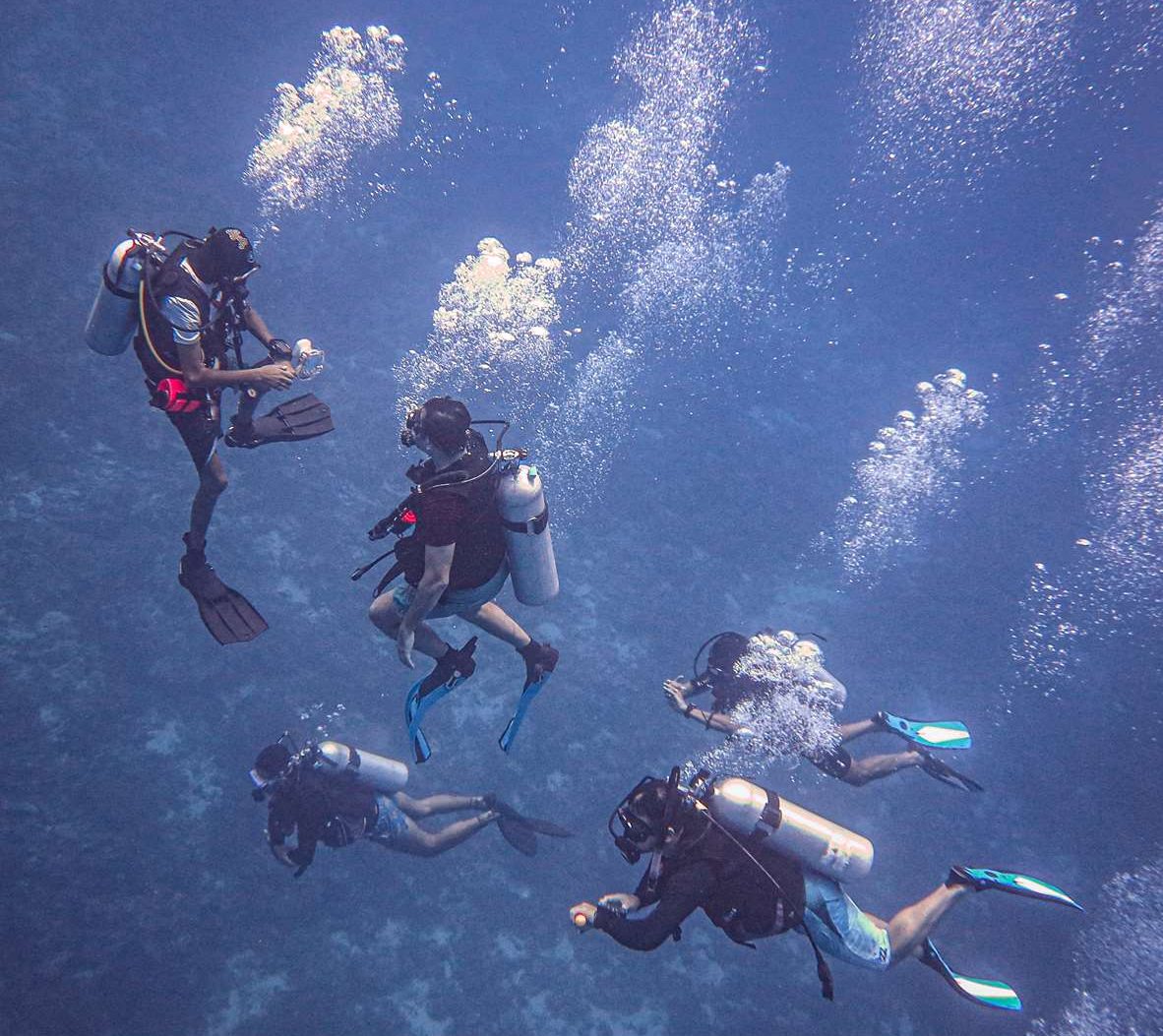
Here are some other programs that might be of interest to you when it comes to developing specific skills…
Reactivate:
With the current Covid-19 situation, in all probability, it has been a while since your last dive. Do you want to recap some of the essential basic underwater skills before moving on? No problem, the PADI reactivate program is specifically designed for this purpose. It will get you back in the water and make you feel confident about your abilities!
Enriched Air Specialty:
It seems so unfair when you have plenty of air left and your computer tells you to shallow up. Ever wished you could stay deeper for longer? Diving with Enriched Air (Nitrox) increases your allowable bottom time. This means you can admire the depths of your favorite dive sites in India, for longer!
Emergency First Response:
This program is a complete CPR and first aid course. It is mostly known by its abbreviation: EFR. The course deals with all aspects of emergency assistance, not just those related to diving. You’ll learn about handling accidents at home and in other daily situations too. Topics covered include CPR, spinal injuries, serious bleeding, choking, shock, splinting… It also includes first aid assessments and many more techniques that can extend a patient’s life. This is a great certification for anyone as it teaches essential lifesaving skills.
PADI Divemaster:
Are you already a PADI Rescue Diver? Thinking of a career in the scuba diving industry in India? Then the PADI Divemaster Course is your first step into professional diving! Unlike other PADI Courses, you’ll be mentored and work alongside your instructor. You’ll gain insight into the workings of the industry and behind-the-scenes at a dive center. You’ll also develop the skills required to assist PADI Instructors with PADI courses. And also learn how to guide certified divers independently.
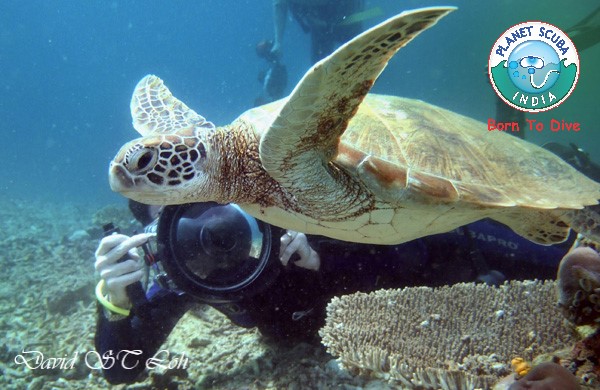
Digital Underwater Photography Specialty:
It’s hard to explain to non-diving family and friends about some of the beautiful life we see underwater. But with amazing images, you don’t need to! Master the techniques required to produce sharper and more colorful images which will impress your buddies and land-loving friends! The best part is that you don’t have to travel too far to get fabulous photographs. There are many sites that you can dive in India too for some amazing clicks and memories.
Other PADI Specialties:
Is there a particular type of diving you want to learn more about? We also offer a full range of PADI Specialty Courses. These allow you to learn more and develop knowledge in specific aspects of diving. Here’s the list of additional PADI specialty courses: Boat Diver. Deep Diver. Drift Driver. Night Diver. Peak Performance Buoyancy. Search & Recovery Diver. Underwater Naturalist. Underwater Navigation. Wreck Diver.
Are you feeling inspired to take your diving to the next level? For more information, send us a message through our online contact form. Or you can email us at: holidays@planetscubaindia.com and we will get right back to you!
By Sarah Wormald, PADI
Disinfecting your scuba diving equipment in India
‘How do I disinfect my scuba diving equipment in India?’ In light of the Covid-19 pandemic, this is the key question doing the rounds. By divers of their own personal scuba gear. By fun divers and students using rented equipment. And by dive professionals and dive centers in India that will soon start renting out their scuba diving equipment.
The specifics of the question lie in the ‘in India’ part. Though there are many articles on the topic, few list products available in our country. Bleach was touted as a savior till fairly recently. And we must say that bleach-based products help keep your personal space, office and dive center sanitized. But can bleach, even in its diluted form, be used on scuba equipment?
The jury is still out on this one. Some equipment manufacturers have released statements based on the CDC recommendations of 1/3 cup bleach per gallon of water. But after multiple tests on its products, Apeks released a blog a few days ago. It stated that divers should “not use bleach-based disinfectants. Or disinfectants known to be corrosive, as these can prematurely age or corrode the equipment being used.”
Our recommendation based on current information:
Disinfecting your dive equipment
Planet Scuba India has been servicing dive equipment with Biox for quite a while now. It is a cleaner that has been designed to remove contaminants on breathing apparatus, including scuba gear. It is non-toxic, non-hazardous and non-flammable. Which means that it can be used without gloves. Unless, you have any cuts or other open wounds on your hands. Of course, that was during the pre-Corona era (when the above image was clicked), right now gloves are a mandatory part of equipment servicing.
Biox has been formulated to aid cleaning in ultrasonic baths. Baths that run at temperatures at which we know the Corona virus strain starts to break down. Still not convinced? The brand has also suggested additional cleaning processes to ensure that traces of bacteria and viruses are removed.
Besides, Biox is an excellent stain remover. It removes surface oils and other particles, thereby reducing the chances of the virus being protected by other contaminants. That means that there are no hiding places for the viruses and bacteria to exist on.
The even better part about this cleaner? It is biodegradable! Yes, you read that right. You don’t need any special methods to dispose of it.
To know more about this safe, non-toxic product and how to use it, send in your emails to info@planetscubaindia.com or contact us online here
Free servicing of scuba diving equipment in India
We know you are as eager as us to get back into the ocean. So why not get your scuba gear checked, before you take that giant leap into the beautiful blue again. After all, equipment servicing is key to safe diving.
Planet Scuba India is offering free servicing, calibration and testing of your Aqua Lung and Apeks BCDs and regulators. We know your next question. The answer is, yes, our technicians are using all the necessary Covid-19 safety precautions. While servicing, and later while handling and packing your dive equipment.
To avail of this limited time offer, contact us online or email us at service@planetscubaindia.com
*The above advice is based on current information regarding Covid-19. It does not reduce the chance of catching the infection post your equipment servicing. Or common sense and adherence to all government and medical guidelines regarding Corona virus.
Scuba diving in India | Myths vs. Facts
Myths that are preventing people from learning scuba diving in India. From fear of shark attacks to having to travel to international waters. We debunk the top five diving myths.
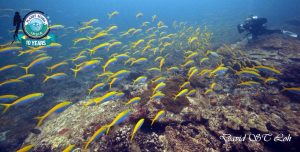
#1: You have to travel to international waters to scuba dive
There are some great sites for scuba diving in India. In fact, for some time now, scuba diving has been available right at your doorstep. For city dwellers, inland dive centers in India are a dream come true. You can complete the theory and confined water sessions of the PADI Open Water Diver Course in your city, over a weekend. (No point being stuck in a classroom on your holiday.) And then head out to the sea to complete your open water dives. Scuba diving in India is available at Goa, Andaman Islands, Lakshadweep, Netrani, Gujarat, Chennai, Pondicherry, Kerala and Kovalam. With new dive centres are opening up in different places across the country.
#2: You need to be an Olympic-level swimmer to scuba dive
You need to have basic swimming skills to learn scuba diving. The PADI Open Water Diver Course needs you to swim 200 meters without stopping. But it’s not a race. There is no time limit. The swim and 10 minutes of floating or treading water is just so that your instructor knows you are comfortable in the water.
Still have apprehensions about scuba diving? Ask your dive center about the PADI Discover Scuba Diving experience, before you take the plunge.
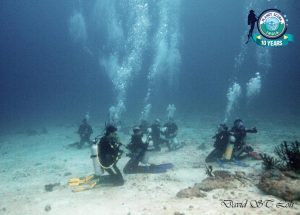
#3: You have to shell out a lot of money for diving gear
While scuba diving is a sport that needs equipment, it doesn’t mean to have to rush out and buy it. Most centers for scuba diving in India and internationally rent out gear. To begin with, you should start with the three basic items: mask, snorkel and fins. Wetsuits are the next on the to-buy list. Start buying gear only once you’re sure you are going to be diving regularly. Besides, renting gear initially will give you a good idea of which brand you should invest in.
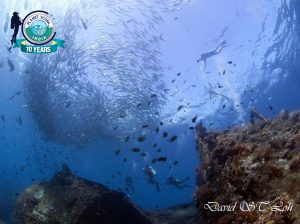
#4: Snorkeling gives you the same experience as scuba diving
We love snorkeling, especially when there are whale sharks or mantas close to the water’s surface. But nothing compares to the immersive experience that scuba diving gives. Why squint at the colorful reef way down below, when you can strap on your diving gear and descend for a closer look. Besides all that swimming on the surface is bound to tire you out. You can stay down much longer and explore more of the ocean when you scuba dive. Think turtles hiding below overhangs. Pygmy seahorses clinging to soft corals. Moray eels peeking out of reefs.
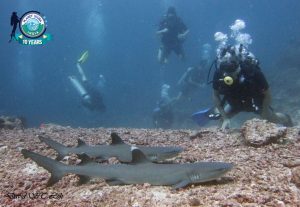
#5: You will get attacked by a shark
The theme song of Jaws hums in the heads of those who have developed a fear of sharks. It is the one of the main reasons why people are apprehensive about scuba diving in India, or anywhere else in the world for that matter. But as most divers will tell you, sharks are the most amazing creatures to see up close. In fact, you should count your lucky stars if you see one during a dive. Sharks are not in the least bit interested in divers. It’s just Bollywood and Hollywood fantastical blockbusters which have given them a bad rep.
6 reasons to learn scuba diving in India right now

Why would you want to restrict your holidays to just 30% of the earth’s surface, when you can go scuba diving in India and explore the rest of the world as well?! Besides, just think about all those amazing Instagrammable images you will click. The envious faces of family, friends and co-workers. And did we mention that the boss can’t get in touch with you when you’re underwater. Yes, it’s time to tick diving off your bucket list. Especially since you can learn scuba diving in India in your very own city.
1. Learn scuba diving in India & explore the most fascinating place on earth
Fancy yourself a traveler? As a scuba diver, you can claim exploration of the seas as well. Maybe, even discover a spectacular dive site! We kid you not. This is a strong possibility when scuba diving in India since only one per cent of the country’s 8,000 km coastline has been explored.
2. Escape to a tranquil world
Think of your last holiday and the number of times your boss or that pesky colleague sent you a message asking for some document or email they simply could not locate. Now think about your upcoming trip scuba diving in India and how you can claim no network underwater. No phone calls, no messages, no emails. Just eat, sleep, dive, repeat!
3. Experience a world both old and new
If you are a history buff, just think of the shipwrecks, underwater monuments and other fabulous sites you could explore when diving in India. The 9,000-year-old lost city of Dwarka in Gujarat, for example. Or the shipwrecks at Minicoy, Lakshadweep. Or the diving near an active volcano at Andamans. Every dive has something new and unique to offer, be it that interesting fish you’ve never seen before or the shipwreck you would love to explore.
4. Click the best holiday pictures
A photograph of you clicking a photograph of a turtle. Images of the most scenic beaches. White sands, blue seas, colorful coral, curious fish, your own picture underwater… Counting those Insta likes already?!
5. Make new friends
Diving brings together people from across the globe. People who share a common passion for the world below the waves. Besides, there is no chance you see a 5-meter shark and not come back to the boat and talk about it. Not only will be go back from your scuba diving holiday with new experiences, but also a new set of friends and a better understanding of different cultures.
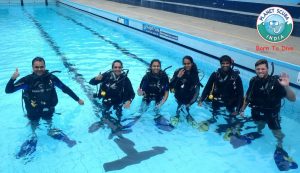
6. Learn scuba diving in India in your own city
Yes, you read that right. You can learn scuba diving in India in your own city. Even if it is a land-locked one like Bangalore. The theory and confined water sessions of the PADI Open Water Diver course can be completed before you head for your adventurous holiday. So you don’t need to spend precious vacation hours in a classroom. Instead, you can giant leap into the blue and discover the last unexplored frontier. You can even advance your skills with courses like the Advanced Open Water Diver, Enriched Air Diver and other PADI specialties.
Ready for your scuba diving in India adventure? Get in touch with us at holidays@planetscubaindia.com or fill in our online contact form, and we’ll get right back to you.
